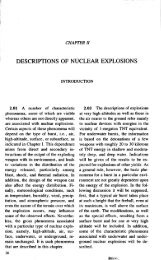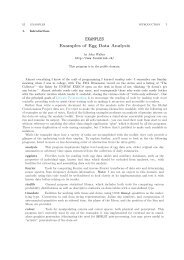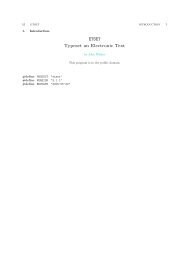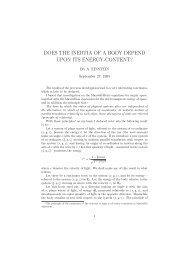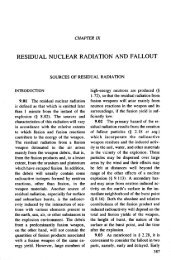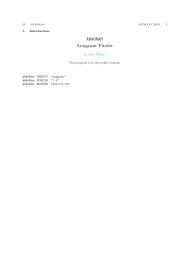- Page 1 and 2:
§1 ANNOYANCE-FILTER INTRODUCTION 1
- Page 3 and 4:
§3 ANNOYANCE-FILTER GETTING STARTE
- Page 5 and 6:
§4 ANNOYANCE-FILTER OPTIONS 5 4. O
- Page 7 and 8:
§4 ANNOYANCE-FILTER OPTIONS 7 −
- Page 9 and 10:
§5 ANNOYANCE-FILTER PHRASE-BASED C
- Page 11 and 12:
§6 ANNOYANCE-FILTER INTEGRATING WI
- Page 13 and 14:
§7 ANNOYANCE-FILTER OPERATING A PO
- Page 15 and 16:
§9 ANNOYANCE-FILTER A BRIEF HISTOR
- Page 17 and 18:
§9 ANNOYANCE-FILTER A BRIEF HISTOR
- Page 19 and 20:
§10 ANNOYANCE-FILTER DICTIONARY WO
- Page 21 and 22:
§13 ANNOYANCE-FILTER DICTIONARY WO
- Page 23 and 24:
§15 ANNOYANCE-FILTER DICTIONARY WO
- Page 25 and 26:
§19 ANNOYANCE-FILTER DICTIONARY 25
- Page 27 and 28:
§23 ANNOYANCE-FILTER DICTIONARY 27
- Page 29 and 30:
§24 ANNOYANCE-FILTER DICTIONARY 29
- Page 31 and 32:
§27 ANNOYANCE-FILTER DICTIONARY 31
- Page 33 and 34: §31 ANNOYANCE-FILTER DICTIONARY 33
- Page 35 and 36: §32 ANNOYANCE-FILTER FAST DICTIONA
- Page 37 and 38: §33 ANNOYANCE-FILTER FAST DICTIONA
- Page 39 and 40: §35 ANNOYANCE-FILTER FAST DICTIONA
- Page 41 and 42: §37 ANNOYANCE-FILTER FAST DICTIONA
- Page 43 and 44: §40 ANNOYANCE-FILTER MIME DECODERS
- Page 45 and 46: §41 ANNOYANCE-FILTER MIME DECODERS
- Page 47 and 48: §45 ANNOYANCE-FILTER MIME DECODERS
- Page 49 and 50: §47 ANNOYANCE-FILTER SINK MIME DEC
- Page 51 and 52: §50 ANNOYANCE-FILTER BASE64 MIME D
- Page 53 and 54: §55 ANNOYANCE-FILTER BASE64 MIME D
- Page 55 and 56: §57 ANNOYANCE-FILTER BASE64 MIME D
- Page 57 and 58: §60 ANNOYANCE-FILTER QUOTED-PRINTA
- Page 59 and 60: §63 ANNOYANCE-FILTER QUOTED-PRINTA
- Page 61 and 62: §66 ANNOYANCE-FILTER MULTIPLE BYTE
- Page 63 and 64: §68 ANNOYANCE-FILTER DECODER PAREN
- Page 65 and 66: §71 ANNOYANCE-FILTER EUC DECODER 6
- Page 67 and 68: §75 ANNOYANCE-FILTER SHIFT-JIS DEC
- Page 69 and 70: §79 ANNOYANCE-FILTER SHIFT-JIS DEC
- Page 71 and 72: §83 ANNOYANCE-FILTER UTF-8 UNICODE
- Page 73 and 74: §84 ANNOYANCE-FILTER UTF-8 UNICODE
- Page 75 and 76: §87 ANNOYANCE-FILTER INTERPRETERS
- Page 77 and 78: §91 ANNOYANCE-FILTER GB2312 INTERP
- Page 79 and 80: §96 ANNOYANCE-FILTER UNICODE INTER
- Page 81 and 82: §99 ANNOYANCE-FILTER APPLICATION S
- Page 83: §100 ANNOYANCE-FILTER FLASH STREAM
- Page 87 and 88: §108 ANNOYANCE-FILTER FLASH STREAM
- Page 89 and 90: §110 ANNOYANCE-FILTER FLASH STREAM
- Page 91 and 92: §111 ANNOYANCE-FILTER FLASH STREAM
- Page 93 and 94: §114 ANNOYANCE-FILTER FLASH TEXT E
- Page 95 and 96: §115 ANNOYANCE-FILTER FLASH TEXT E
- Page 97 and 98: §119 ANNOYANCE-FILTER FLASH TEXT E
- Page 99 and 100: §120 ANNOYANCE-FILTER FLASH TEXT E
- Page 101 and 102: §121 ANNOYANCE-FILTER FLASH TEXT E
- Page 103 and 104: §122 ANNOYANCE-FILTER FLASH TEXT E
- Page 105 and 106: §125 ANNOYANCE-FILTER PDF TEXT EXT
- Page 107 and 108: §127 ANNOYANCE-FILTER PDF TEXT EXT
- Page 109 and 110: §129 ANNOYANCE-FILTER MAIL FOLDER
- Page 111 and 112: §129 ANNOYANCE-FILTER MAIL FOLDER
- Page 113 and 114: §130 ANNOYANCE-FILTER MAIL FOLDER
- Page 115 and 116: §131 ANNOYANCE-FILTER MAIL FOLDER
- Page 117 and 118: §133 ANNOYANCE-FILTER MAIL FOLDER
- Page 119 and 120: §136 ANNOYANCE-FILTER MAIL FOLDER
- Page 121 and 122: §138 ANNOYANCE-FILTER MAIL FOLDER
- Page 123 and 124: §139 ANNOYANCE-FILTER MAIL FOLDER
- Page 125 and 126: §144 ANNOYANCE-FILTER MAIL FOLDER
- Page 127 and 128: §147 ANNOYANCE-FILTER MAIL FOLDER
- Page 129 and 130: §149 ANNOYANCE-FILTER MAIL FOLDER
- Page 131 and 132: §152 ANNOYANCE-FILTER MAIL FOLDER
- Page 133 and 134: §157 ANNOYANCE-FILTER MAIL FOLDER
- Page 135 and 136:
§160 ANNOYANCE-FILTER MAIL FOLDER
- Page 137 and 138:
§164 ANNOYANCE-FILTER MAIL FOLDER
- Page 139 and 140:
§166 ANNOYANCE-FILTER MAIL FOLDER
- Page 141 and 142:
§169 ANNOYANCE-FILTER MAIL FOLDER
- Page 143 and 144:
§170 ANNOYANCE-FILTER TOKEN DEFINI
- Page 145 and 146:
§173 ANNOYANCE-FILTER TOKEN PARSER
- Page 147 and 148:
§173 ANNOYANCE-FILTER TOKEN PARSER
- Page 149 and 150:
§174 ANNOYANCE-FILTER TOKEN PARSER
- Page 151 and 152:
§177 ANNOYANCE-FILTER TOKEN PARSER
- Page 153 and 154:
§178 ANNOYANCE-FILTER TOKEN PARSER
- Page 155 and 156:
§182 ANNOYANCE-FILTER TOKEN PARSER
- Page 157 and 158:
§185 ANNOYANCE-FILTER CLASSIFY MES
- Page 159 and 160:
§189 ANNOYANCE-FILTER CLASSIFY MES
- Page 161 and 162:
§191 ANNOYANCE-FILTER CLASSIFY MES
- Page 163 and 164:
§193 ANNOYANCE-FILTER POP3 PROXY S
- Page 165 and 166:
§194 ANNOYANCE-FILTER POP3 PROXY S
- Page 167 and 168:
§199 ANNOYANCE-FILTER POP3 PROXY S
- Page 169 and 170:
§202 ANNOYANCE-FILTER POP3 PROXY S
- Page 171 and 172:
§205 ANNOYANCE-FILTER POP3 PROXY S
- Page 173 and 174:
§209 ANNOYANCE-FILTER POP3 PROXY S
- Page 175 and 176:
§212 ANNOYANCE-FILTER POP3 PROXY S
- Page 177 and 178:
§214 ANNOYANCE-FILTER POP3 PROXY S
- Page 179 and 180:
§219 ANNOYANCE-FILTER POP3 PROXY S
- Page 181 and 182:
§223 ANNOYANCE-FILTER MAIN PROGRAM
- Page 183 and 184:
§228 ANNOYANCE-FILTER MAIN PROGRAM
- Page 185 and 186:
§232 ANNOYANCE-FILTER HEADER INCLU
- Page 187 and 188:
§237 ANNOYANCE-FILTER HEADER INCLU
- Page 189 and 190:
§242 ANNOYANCE-FILTER HEADER INCLU
- Page 191 and 192:
§243 ANNOYANCE-FILTER HEADER INCLU
- Page 193 and 194:
§243 ANNOYANCE-FILTER HEADER INCLU
- Page 195 and 196:
§243 ANNOYANCE-FILTER HEADER INCLU
- Page 197 and 198:
§243 ANNOYANCE-FILTER HEADER INCLU
- Page 199 and 200:
§245 ANNOYANCE-FILTER HEADER INCLU
- Page 201 and 202:
§250 ANNOYANCE-FILTER ISO 8859-1 C
- Page 203 and 204:
§255 ANNOYANCE-FILTER RELEASE HIST
- Page 205 and 206:
§256 ANNOYANCE-FILTER DEVELOPMENT
- Page 207 and 208:
§256 ANNOYANCE-FILTER DEVELOPMENT
- Page 209 and 210:
§256 ANNOYANCE-FILTER DEVELOPMENT
- Page 211 and 212:
§256 ANNOYANCE-FILTER DEVELOPMENT
- Page 213 and 214:
§256 ANNOYANCE-FILTER DEVELOPMENT
- Page 215 and 216:
§256 ANNOYANCE-FILTER DEVELOPMENT
- Page 217 and 218:
§256 ANNOYANCE-FILTER DEVELOPMENT
- Page 219 and 220:
§256 ANNOYANCE-FILTER DEVELOPMENT
- Page 221 and 222:
§256 ANNOYANCE-FILTER DEVELOPMENT
- Page 223 and 224:
§256 ANNOYANCE-FILTER DEVELOPMENT
- Page 225 and 226:
§256 ANNOYANCE-FILTER DEVELOPMENT
- Page 227 and 228:
§256 ANNOYANCE-FILTER DEVELOPMENT
- Page 229 and 230:
§257 ANNOYANCE-FILTER INDEX 229 ch
- Page 231 and 232:
§257 ANNOYANCE-FILTER INDEX 231 fs
- Page 233 and 234:
§257 ANNOYANCE-FILTER INDEX 233 k:
- Page 235 and 236:
§257 ANNOYANCE-FILTER INDEX 235 pa
- Page 237 and 238:
§257 ANNOYANCE-FILTER INDEX 237 se
- Page 239 and 240:
§257 ANNOYANCE-FILTER INDEX 239 17
- Page 241 and 242:
ANNOYANCE-FILTER NAMES OF THE SECTI
- Page 243 and 244:
ANNOYANCE-FILTER Section Introducti





